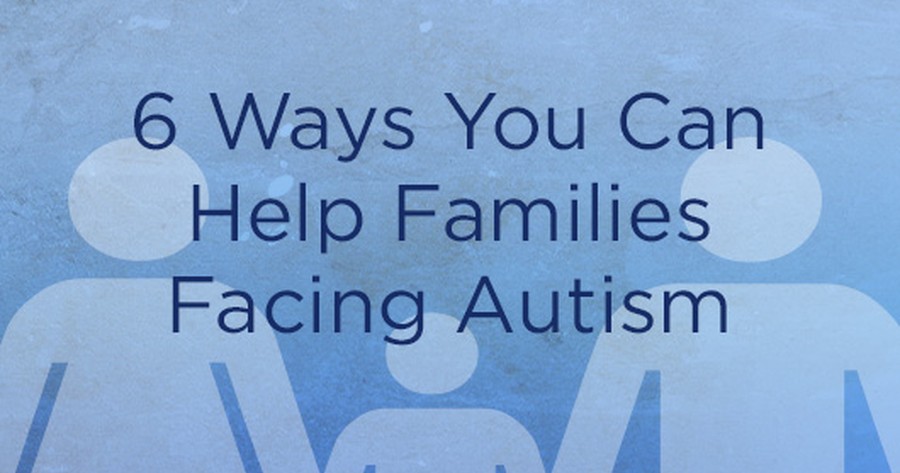Editor's Note: This article is not meant to highlight autism as the only life-changing disorder to which you could minister. The advice and points given could easily apply to any family in your church or circle of friends, who has a special needs child.
Imagine what it's like to see your child's development appear and then regress; then feeling baffled as you're trying to figure out why.
Or imagine what it's like to be a child with sensory problems, screaming for the ceiling fan to be turned off because it sounds too loud.
Picture yourself having a calendar filled with doctor and therapy appointments each week and rarely a moment to catch your breath.
This is just a small window into what it's like to live with autism.
One day a family might look back and say, “By God's grace we survived autism, and you helped us!”
Autism is a life-changing neurological disorder, altering every part of the day for the child and the families who love them. Exhaustion and confusion are regular parts of the everyday picture. Treatment decisions are weighed and prayed over on a continual basis. Even siblings have their own package of emotions as they grapple with the loss of normalcy in their family. It doesn't take being around a family very long to make your heart ache to know something, anything you can do to help.
The good news is, there are six practical things you can do.
Does their autistic son only wear his underwear around the house? If you're wondering why, ask the parents. Many issues that look like a picky, out-of-control child are, in fact, sensory issues. Parents welcome questions because it reveals interest and the willingness to learn. Read a book on autism, especially a book the family recommends—it will increase your understanding and compassion to minister.
Watching a child with autism is different, but certainly not impossible. Start by coming to the child's home, just to visit with the parents and build a relationship with the him or her. After you've visited several times, try watching the child for thirty minutes or so. Have the cell number of the parents handy so you can call and ask any questions. This method will help you build confidence. Siblings will often be a big help, too, equipping you with insightful information about their brother or sister.
There are people who are good at babysitting and others who are good at the everyday, practical tasks. Mothers often run behind on housework, due to the constant running. Fathers of kids with autism can be behind on home upkeep because they're watching the child in shifts with the mother or working extra hours to pay for special treatments. Consider anything you can do to help catch them up on basic chores, repairs, or other maintenance. You can also consider blessing the family with a meal on one of the days their child does therapy. These things are a dose of grace and an incredible relief to the family.
As much as you long to help physically, never forget how much simply being a friend of the family will mean to them. Many suffer socially because others don't understand their family life and shy away. Friendship in and of itself can be a ministry. You might be the one person who invites them to your house for dinner. You might be one of the few friends who just listens to their plight and offers to pray, without thinking you have to have all the answers. One day, years later, the family might look back and say, “By God's grace we survived autism, and you helped us!”
- Ask Questions & Educate Yourself
- Learn How to Watch the Child
- Help Around the House
- Financial Ministry
Autism affects family finances for a variety of reasons. Caring for the child may mean a lack of income. There may also be extra expenses because of treatments or special diets. If you feel led, there are a number of ways to give a financial gift:
- Anonymous giving sent through your church or sent through the family's closest relative or friends
- Gift certificates toward treatments or stores where special foods are purchased
- Paying toward basic living expenses, such as utilities
- Giving toward a piece of therapeutic equipment the family needs, either with a group from church or through a fundraiser
- Serve the Siblings
Siblings can struggle with feelings that outsiders sometimes miss. Their sibling's autism requires extra time and attention from the parents. Or they feel hurt because their sibling can't play normally, making them feel disconnected. If you feel drawn to the siblings, there are a few ways you can help:
- Let them talk about their emotions. Siblings often struggle with false guilt and need someone who can help sort things out, just by listening first.
- Is there an activity they want to be involved in? You can offer to step in and take them each week.
- Watch their brother or sister so they can spend time with dad and mom.
- Everyone Needs Friends
Does this article remind you of someone in your life? Reach out today in some way, even if by a short message. Pray for future ministry opportunities to show the love of Christ.






Join the Discussion